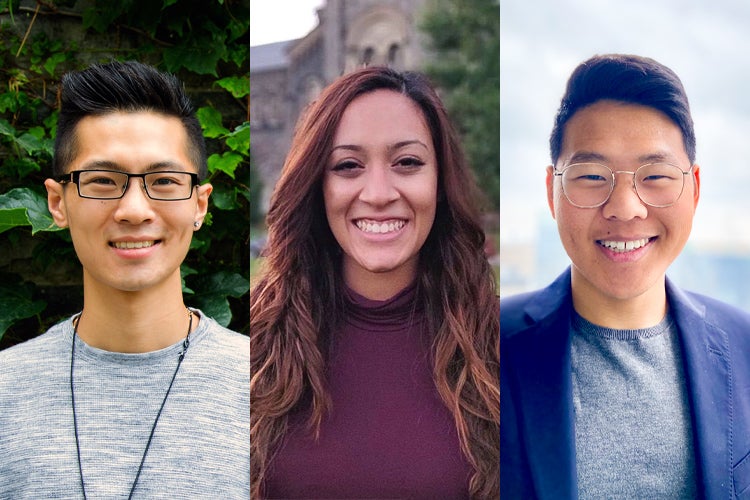U of T students in medicine, public health put their education to work during COVID-19 crisis

Published: April 24, 2020
It’s no coincidence that students at the University of Toronto’s Institute for Health Policy, Management and Evaluation (IHPME) at the Dalla Lana School for Public Health are rushing to respond to the COVID-19 outbreak.
That’s particularly the case when it comes to students who are part of the institute’s System Leadership and Innovation program (SLI). Many are actively curating resources and data to support health professionals and community members.
“What we’ve been learning about health-system leadership has never been more applicable and relevant,” says Ushma Purohit, a second-year SLI and U of T Faculty of Medicine student. “We’re grateful to have the time, ability and resources to help front-line health care professionals and the Toronto community during this pandemic.”
Purohit is involved in a number of COVID-19 activities, including the COVID19 Central website, an online hub of news and resources that simplifies access to information for the general public as well as for health-care providers. To curate these online resources, Purohit worked with a team of SLI students, including Daniel Lee, Monisha Persaud and Geoffrey Sem. The website is currently scaling up to reflect local, provincial and national information.

Geoffrey Sem, Monisha Persaud and Daniel Lee helped create the COVID19 Central website, an online hub of news and resources that simplifies access to information for the general public as well as for health-care providers (photos courtesy of Faculty of Medicine)
Purohit is also working with a separate team to launch a site called COVID19Ask. The website seeks to provide well-researched and expert-verified answers to the most frequently asked questions regarding COVID-19. Under the leadership of U of T Medicine Assistant Professor Michael Fralick, all answers are reviewed by a team of infectious disease experts, physicians and epidemiologists. Topics include COVID-19 transmission, risk factors, rules of social distancing and vaccine availability.
“The hope is that these websites will address the significant need for credible information regarding COVID-19, and consequently decrease the six-hour wait time that Telehealth Ontario is experiencing,” says Purohit.
Another big COVID-19 resource gap, according to Lee, is front-line health-care professionals’ childcare needs. That’s why during March Break, he helped recruit more than 500 student volunteers from medicine, public health, nursing, social work, and other health faculties to support health professionals with these day-to-day tasks.
“I think all of us were seeing our preceptors and instructors going to the front lines and we want to help out as much as we can,” says Lee, a second-year SLI and U of T Medicine student.
Lee co-led a steering committee that matched student volunteers with health-care professionals on a one-on-one basis. Volunteer safety is paramount and the committee constantly reviews and discusses public health guidelines to evaluate risks, Lee says.
The student organization has helped hundreds of health-care professionals, clocked thousands of volunteer hours and earned significant media attention for their efforts. Lee says the group’s success is due in part to its clear vision and mission, which were carefully considered from day one.
“To mobilize a team of volunteers in the midst of a pandemic where face-to-face interaction was restricted, we knew we had to create a strong organizational culture that could be felt in a digital space,” says Lee.
Lee says that SLI training was invaluable to inform the scale and impact of volunteer efforts, and to ensure dedicated links of accountability. This experience leading a grassroots student initiative has taught Lee that he’s a systems thinker and ignited his passion for system leadership through structure, roles and architecture. Such thinking combined with a context that takes into account social determinants of health is helping shape the next generation of health-system leaders who understand that medicine is often an acute intervention at the end of a long timeline of social influences.
“The pandemic is highlighting issues among marginalized groups that already existed. For example, individuals that live in homeless shelters or long-term care homes with no option to socially isolate are being disproportionally affected,” Lee says.
To help address social isolation, Lee is also part of the Student-Senior Isolation Prevention Partnership (SSIPP), an ongoing initiative that pairs students with socially isolated older adults in the community to provide weekly phone check-ins to promote social connection and improve health literacy of COVID-19.
Lee works alongside fellow SLI students Persaud, Sem and Victoria O’Driscoll to lead more than 270 student volunteers across U of T who signed up to participate in SSIPP during the pandemic. Beyond the regular check-ins, volunteers are also teaching seniors to use technology, assisting with grocery delivery and are developing a FAQ for seniors regarding COVID-19 and relevant community resources.
“Ageism and social isolation are among the most prevalent issues faced by seniors today, even before COVID-19, impacting mental health, health-care utilization and quality of life of seniors,” says Persaud, a second-year SLI and U of T Medicine student.
The partnership is scaling up nationally to include more than 15 additional chapters at universities across Canada. Along with SSIPP’s executive team, Persaud is co-leading the expansion efforts by providing her national peers with process documents, individual training, recruitment guidelines and logistical support for matching.
“SSIPP has taught me about the role of empathy and advocacy in clinical practice,” says Persaud, who admires Assistant Professor Andrew Boozary’s work to address loneliness as a public health issue.
SSIPP fosters empathy and positive attitudes towards older adults, which has been linked to better quality of care amongst clinicians. These differences in outcomes are expected to be assessed in a potential new study of the SSIPP program in collaboration with a number of Toronto Western Hospital researchers, including Sabrina Akhtar and Noah Crampton.
Persaud, Lee and Purohit agree that working during a pandemic is a marathon, not a sprint, and are trying to strike a balance between productivity and self-care.
“I’m 10 times busier now and it’s difficult trying to balance both the SLI and Medicine programs, end-of-term projects and our volunteer commitments, but our instructors have shown flexibility with assignments, which we’re really grateful for,” says Purohit.
“I learned that I’m a better leader when I engage with the vision of the project. Where there’s a need, an opportunity for impact and I have a personal interest in the mandate of the project, I’m more likely to be successful.”



